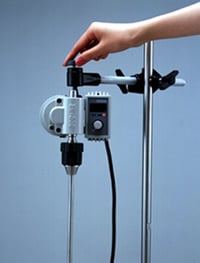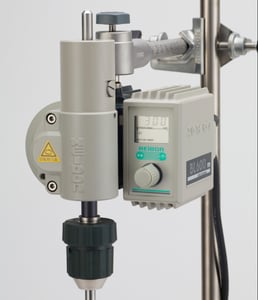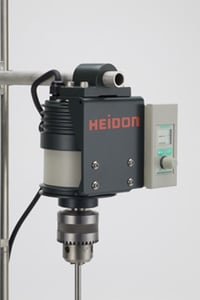 As of 2018, the global production of polymers reached 360 million metric tons. And by the year 2050, it’s estimated that the production of polymers will triple, accounting for one-fifth of total global oil consumption.
As of 2018, the global production of polymers reached 360 million metric tons. And by the year 2050, it’s estimated that the production of polymers will triple, accounting for one-fifth of total global oil consumption.
Since the introduction of the mass production of plastics and polymers in the 1940s, they’ve become a regular part of our daily lives. We rely on polymers for everything from medical supplies to car seats, which means that it is essential to fabricate trustworthy polymers that are made to last.
What instruments are essential in any polymer development lab? Here’s what you need in your laboratory at every stage of creation:
The Development Stage: Laboratory Mixers
Polymers have countless uses in all aspects of our everyday lives, including grocery bags, water bottles, modern textiles, phones, computers, food packaging, auto parts, toys and even technology. These products don’t use just one formula; they all rely on polymers of various strengths.
To adjust these formulas to varying stiffnesses, toughness levels and strengths, polymer scientists and chemists add mix-in particles to the polymers. This can also make the product safer to work with, more flexible or more ideal for its intended purpose.
But polymers are only strong and reliable if they are well mixed. An imperfectly mixed polymer can produce “considerable variations in molecular weight distribution,” causing undesirable flaws and imperfections. For chemists looking to create and thoroughly test a reliable polymer in a lab, they need a mixer that is up to the task.
These added particles need to be completely mixed in with the polymer, and in the case of heavy or viscous polymers, a laboratory mixer with a strong, constant motor like the BL1200S is crucial to a thorough blend.
The Importance of a Dependable Mixer
Polymers must be exhaustively tested before they are ready for manufacturing or distribution. During each polymer’s process simulation, you need a lab mixer that will not overheat, which can affect the polymer. A constant temperature gives you the opportunity to test the mixing of the polymer independent from other conditions (like heat) to discover any inherent defects or stability issues in a controlled environment.
At any viscosity, our lab mixers evenly mix your polymers into a fully homogeneous blend. Our reciprocating models are unlike any other—they raise and lower as they mix, making them ideal to eliminate “ring layers” of different additives. This reciprocating motion will ensure that the entire batch of each manufactured polymer is wholly and evenly mixed.
Some lab mixers have inherent defects that can present problems when developing polymers. For one, many lesser mixers have motor issues that spark as they operate. Since polymers are made with volatile substances, this can cause a fire.
How do you eliminate the problem? Our Three-One motors are also known as brushless motors. These motors have been specially engineered to prevent sparking, nearly eliminating the risk of fire, and are entirely encased to prevent particles from creeping in and damaging the inner workings of the motor. They’re also designed with consistency in mind, which means that even as your polymer changes in viscosity, our lab mixers continue at the same speed for a truly controlled process. They are so strong, that you can literally grab the mixer shaft with your hand and the rotational speed won't change.... watch out hand!
The Creation Stage: Polymer Moisture Levels
More than 80 percent of plastics and polymers sold today are made of thermoplastics, which use injection molding. These polymers must be able to melt and require a certain amount of moisture to do so.
The problem? Too much moisture and the plastics risk surface or structural damage or corrosive wear. Too little moisture and the polymers could be brittle, shatter easily or cause defects that result in the incomplete formation of the final product during molding.
This means that for optimal melting and forming of thermoplastic polymers, plastics (such as plastic pellets) must be dried in an oven before being processed to reach a specific water-content range.
As polymer chemists develop new formulas, a near-infrared (NIR) moisture meter like the K230 Advanced Laboratory NIR Moisture Meter is useful to ensure that the polymer’s moisture content is within an optimal water content range.
The KB230 has an automatic rotating turntable that takes a moisture reading of the entire sample, so even if you are testing plastic pellets or other heterogeneous polymer samples, you can ensure you have accurate results. This gives your lab team the luxury of constant monitoring to develop a polymer manufacturing process with optimal moisture levels.
The Testing Stage: Polymer Stress Monitors
Plastics and polymers need to be manufactured with exact precision, or they will contain flaws that can lead to cracking and shattering. To keep this from happening, polymers need to be tested as a final product.
Everything about how polymers are made can introduce stresses—especially when the polymers are clear. And creating a reliable polymer is not an easy feat. Single molecules have to align perfectly, creating larger macromolecules like building blocks; they need to be put together in a particular way, or they will topple. Without the aid of an instrument, polymers might appear faultless to the naked eye but can contain major structural issues.
We can identify stresses in polymers using the Model H25 Polymer Stress Monitor. This instrument uses color spectra to identify potential stresses. Polymer samples can be evaluated for faults using the instrument’s lens, which displays fractures and structural discontinuities in white. This can help polymer scientists adjust their formulas and polymerization processes for a stronger, safer polymer.
The H25 Polymer Stress Monitor will work on any polymer product manufactured using an injection mold or via extrusion forming and uses a fluorescent light source to point out potential failure areas.
Do you develop polymers for plastic products or plastic coatings or use polymers in your production processes? We can supply the instruments you need to be successful, from mixers to moisture meters to stress monitors. Contact us today—our engineers are well versed in the language of polymers, and we’re ready to assist you in creating durable, long-lasting, high-quality polymers.


